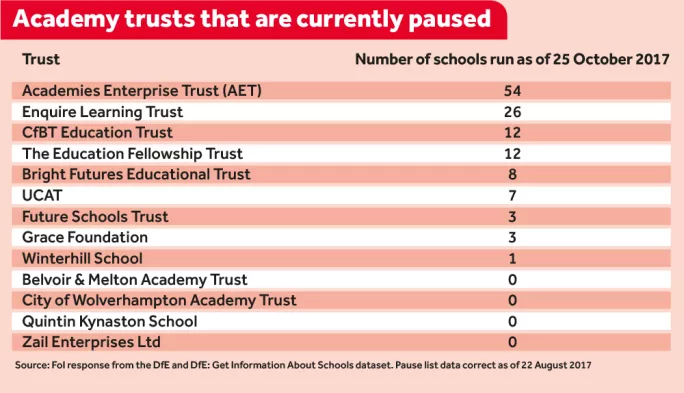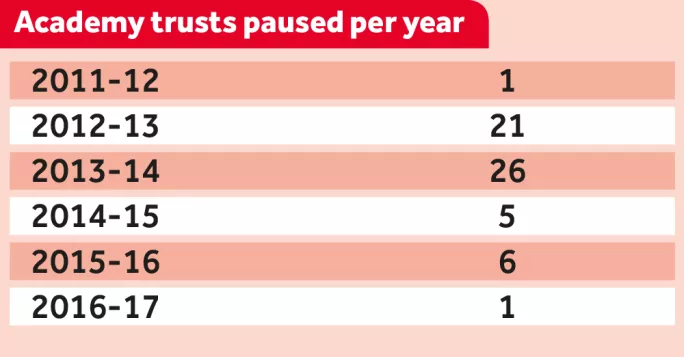‘Out of control’: how the DfE allowed troubled MATs to expand

When Wakefield City Academies Trust (WCAT) announced its imminent collapse in the first week of the new school year, parents were not alone in asking how events could have been allowed to get this far.
Within weeks, the Department for Education proposed new sponsors for all of its 21 schools. However, questions remain about why the trust was allowed to expand when it had long-standing problems that eventually led to its demise.
In 2011-12, the DfE introduced a mechanism to pause the growth of academy trusts about which it had “serious concerns”. It has used it 60 times, including with WCAT. But even though the trust’s troubles were serious enough for it to be paused for a period, this restriction was lifted and it was allowed to expand again - only to end up giving up all its schools.
A Tes analysis has revealed a number of cases where trusts that had seen restrictions lifted subsequently ran into difficulties, and others where trusts were never formally paused by the DfE, despite having been the subject of serious concerns.

For Angela Rayner, Labour’s shadow education secretary, this provides “yet more evidence of a system out of control”. And Robert Hill, an education consultant and former Downing Street adviser to Tony Blair, says that “the use of the ‘pause’ button has been somewhat haphazard”.
WCAT was paused in 2012-13, but the DfE lifted this restriction the following year. Over the years that followed, it took on 11 more schools.
But a confidential report written by its interim chief executive Chris Pickering in June 2017, seen by Tes, lists a damning catalogue of long-running financial, cultural and educational problems at the trust.
WCAT had, Pickering writes, “failed to establish the necessary infrastructure to support all aspects of the growth and development of a MAT (multi-academy trust). It has grown far too quickly.”
Rayner believes the revelation reflects wider problems with the government’s oversight of academies.
“As each new controversy from Wakefield City Academies Trust shows, the government has consistently failed to properly manage the expansion of multi-academy trusts, with countless students losing out as a result,” she says.
Questions asked
WCAT is one of 58 academy trusts that have seen their growth formally paused since 2011-12. In two cases - the Academy Transformation Trust (ATT) and the Education Fellowship Trust - growth was paused on two separate occasions.
In response to a freedom of information request, the DfE said a sponsor’s expansion would be paused should serious concerns be raised about its educational impact, finances, leadership or governance.
But questions have been asked about the success of the government’s attempts to quality assure MAT expansion, after a Tes analysis identified a number of trusts that received official warning or pre-warning notices about standards, or financial notices to improve, after having their pause lifted - or that were never formally paused in the first place.
Mary Bousted, joint general secretary of the National Education Union, believes the DfE has struggled to balance its desire to increase the number of the number of academies with the need to quality control the trusts that will sponsor them.
“There’s one big problem the government has got with trying to pause multi-academy trusts,” she says. “It is this: there are not enough multi-academy chains.”

The government has been moving away from formally pausing academy trusts.
The peak years were 2012-13 and 2013-14, when 21 and 26 chains were paused respectively, but the numbers dropped as low as one in the years that followed. At present, 13 trusts remain formally paused, including one of England’s biggest academy chains, Academies Enterprise Trust, whose growth has been on hold since 2012-13.
Last year, national schools commissioner Sir David Carter outlined new “growth checks” for MATs to assess whether a trust should be allowed to sponsor more academies.
Rather than giving a pass or fail judgement on a trust, the DfE told the Commons Education Select Committee it would “assess the MAT’s capacity to grow successfully and take responsibility for a number of schools”.
In their report, issued in February, the MPs welcomed the trust checks, but urged that the government “must place tight restrictions on the growth of MATs and use their ‘growth check’ to ensure that MATs are only permitted to take on more schools when they have the capacity to grow successfully”.
Bousted dismisses Carter’s growth checks as “just words, words, words”. “None of this,” she adds, “addresses the real issue that, however you cut it, where’s the support available for schools that are struggling?”
Hill believes that health checks, MAT reviews, peer reviews and self-assessment frameworks are “all indicators of a more committed focus to the quality and not just the quantity of MATs”.

Whether the new health checks succeed in preventing a repeat of WCAT’s failure remains to be seen, but Hill believes regional schools commissioners and headteacher boards “still ought to do some soul searching about some of the MAT growth they have allowed”.
A DfE spokesperson says that academy trusts “operate under a strict system of oversight and accountability. We take quick and decisive action to address underperformance, including pausing the growth of sponsors where we have serious concerns and rebrokering academies”.
“The department routinely monitors the progress and growth of all academy sponsors and Regional Schools Commissioners closely monitor all sponsors where there are any concerns,” the spokesperson adds.
In the case of WCAT, the DfE says it was “right to give the trust an opportunity to demonstrate that it [could] make sustainable improvements at its academies”, and that the decision to terminate its funding agreement “was not taken lightly”.

You need a Tes subscription to read this article
Subscribe now to read this article and get other subscriber-only content:
- Unlimited access to all Tes magazine content
- Exclusive subscriber-only stories
- Award-winning email newsletters
Already a subscriber? Log in
You need a subscription to read this article
Subscribe now to read this article and get other subscriber-only content, including:
- Unlimited access to all Tes magazine content
- Exclusive subscriber-only stories
- Award-winning email newsletters